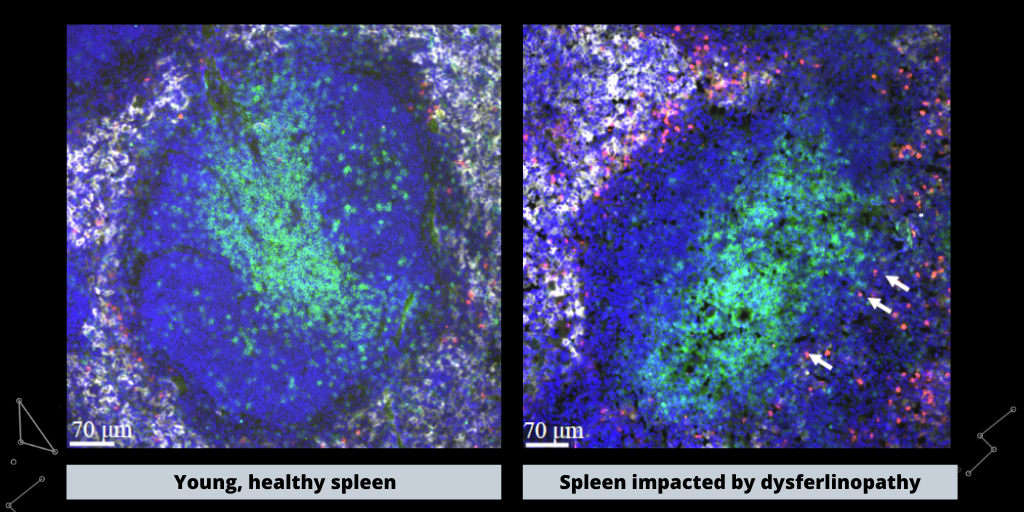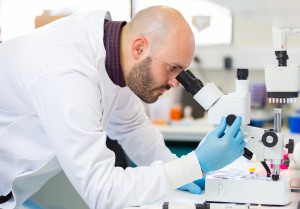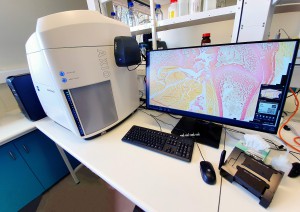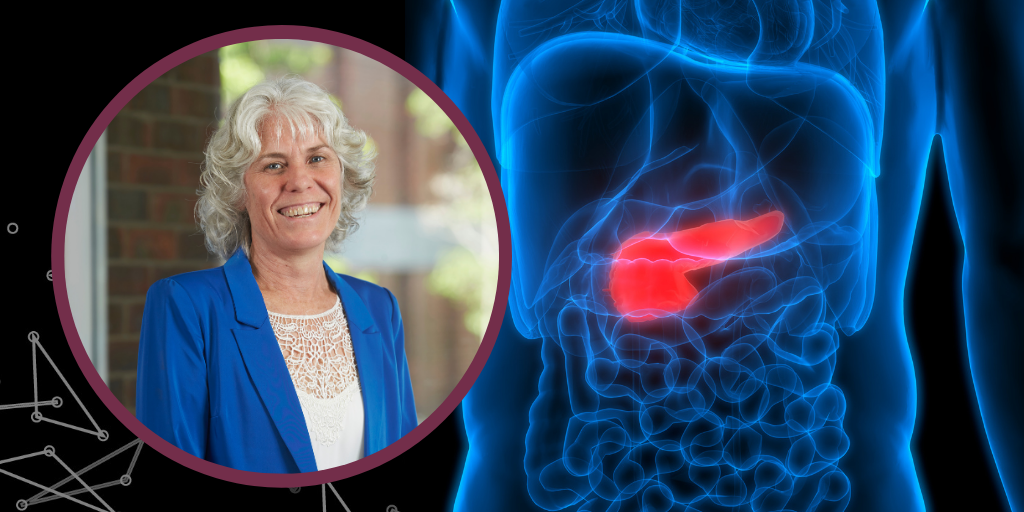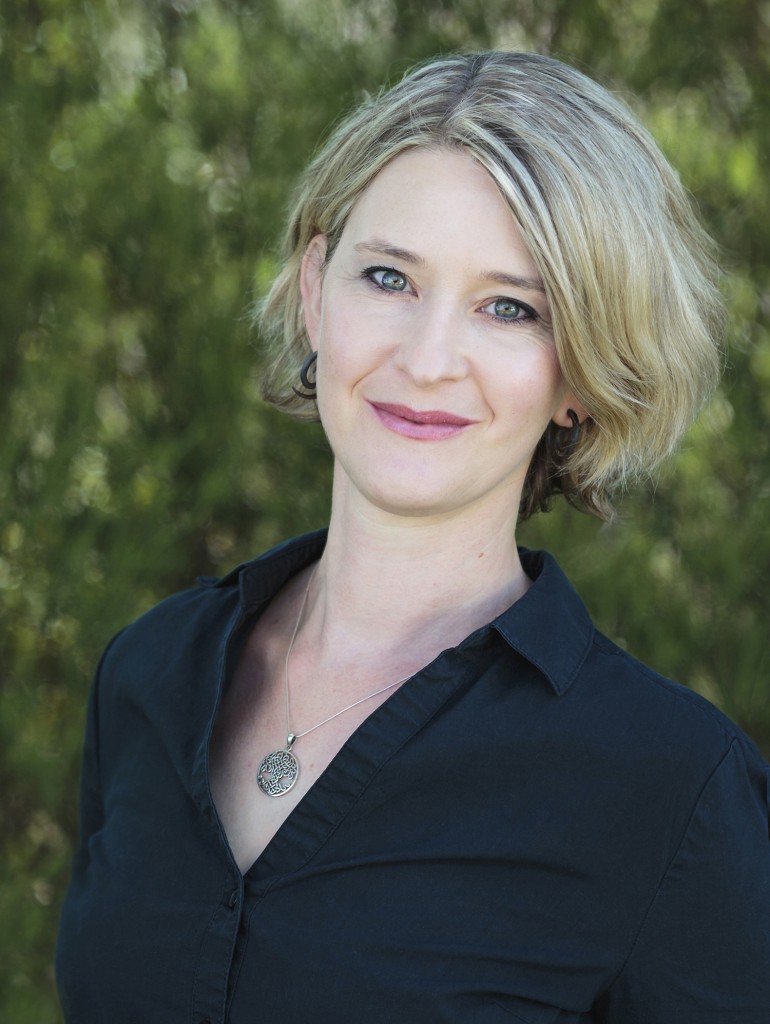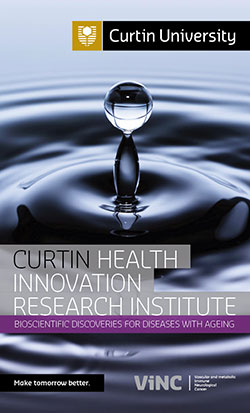I am delighted to announce that Connie Jackaman and Virginie Lam have been appointed as members of the inaugural Curtin EMCR Network Steering Committee.
Funding to apply immunology research for insights into muscle disease
The JAIN Foundation funds basic and translational research focused on understanding and curing dysferlinopathy. JAIN has awarded CHIRI researcher Dr Connie Jackaman, in collaboration with Dr Hannah Radley (also CHIRI) and Prof Miranda Grounds (UWA), with funding of $159,089 for immune-based research into this form of muscle disease.
Connie, a mid-career research fellow with CHIRI and Curtin Medical School, and the team will use the funding to systematically investigate changes across various immune cells in dysferlinopathy during ageing.
One example of this is looking for structural changes in tissues involved in immune function, such as the spleen (see images above). Read more…
Early detection of liver cancer the goal for CHIRI’s newest research fellow
Curtin Health Innovation Research Institute (CHIRI) researcher Dr Rodrigo Carlessi, from Curtin University’s Medical School, has received a Postdoctoral Fellowship from the Cancer Council WA for research to help predict liver cancer at its unseen stages.
Supported for three years with funding totalling $225,000, Rodrigo will progress a research project he is leading at CHIRI, examining a promising method for predicting liver cancer before its appearance in high-risk individuals, with the goal of designing the first screening program for the disease in Australia.
This welcome support from the Cancer Council WA will enable Rodrigo to test further an analytical platform he has developed working as part of CHIRI’s Liver Disease and Regeneration Laboratory. The platform involves acquiring large amounts of biological information from thousands of liver cells with an unprecedented level of detail.
“My aim is to use that technology to identify molecular signatures within damaged liver cells that can score risk and predict liver cancer before it develops, enabling screening for the disease to occur and for liver health to be restored before the damage becomes permanent and catastrophic,” Rodrigo said. Read more…
Curtin Alzheimer’s research project awarded NHMRC funding
New opportunities for the prevention and treatment of Alzheimer’s Disease will be further explored at Curtin-CHIRI, with our Director, Professor John Mamo, and his team receiving a $637K Ideas Grant from the National Health and Medical Research Council (NHMRC).
Announced by Federal Health Minister Greg Hunt, the support will enable the team to further explore a remarkable discovery they have made in this area of research, which you can read more about here: https://buff.ly/387HVcv
Innovative by name and by nature
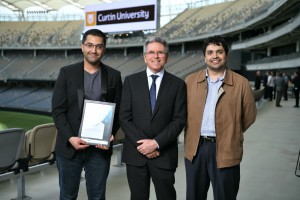
CHIRI’s Dr Armin Mooranian (left) and Dr Hani Al-Salami (right) are among a team of researchers from Curtin-CHIRI whose project was the overall winner of the 2020 Curtinnovation Awards.
A team including Curtin-CHIRI researchers Hani Al-Salami, Armin Mooranian and Daniel Brown just crowned overall winners of the Curtin University 2020 Curtinnovation Awards for their development of a new gel formula treatment that helps improve outcomes for people with hearing loss.
CHIRI’s Josh Ravensdale was also recognised in the Science and Engineering category.
Congratulations to all the winners, including our team and their collaborators.
You can read more about their projects in the Curtin media release: http://bit.ly/3nKLmvX
State-of-the-art technologies moving in have research capabilities moving up
The highly anticipated commissioning of a $1.2 million super-rapid speed confocal microscopy suite at the Curtin Health Innovation Research Institute (CHIRI) is a step closer this week with the slide scanner component of the technology now installed (watch a short video here).
Funded principally through the Australian Research Council’s (ARC) Linkage Infrastructure, Equipment and Facilities (LIEF) 2020 scheme, the Zeiss Axioscan.Z1 slide scanner will soon to be joined by an Andor Dragonfly 502 Confocal Microscope to establish Western Australia’s only super-rapid speed, high-throughput confocal microscopy facility.
CHIRI Director Professor John Mamo said these high-tech additions to CHIRI’s research facilities would return WA rapid acquisition fluorescent microscopy to the cutting edge.
“It’s an exciting time for both our institute and the wider WA research community, as we mark the penultimate step in establishing what will be the best super-rapid speed confocal microscopy suite in the state at Curtin-CHIRI,” Professor Mamo said.
“The super-rapid speed confocal microscope will provide WA researchers with contemporary state-of-art opportunities to analyse living cells and large-area tissue specimens in three-dimensions with the highest possible speed and high-resolution. The slide scanner digitises microscopy slides for viewing, managing and electronic storage, and helps scientists generate data for image analysis.” Read more…
Applying the lotus-effect to liver cancer research
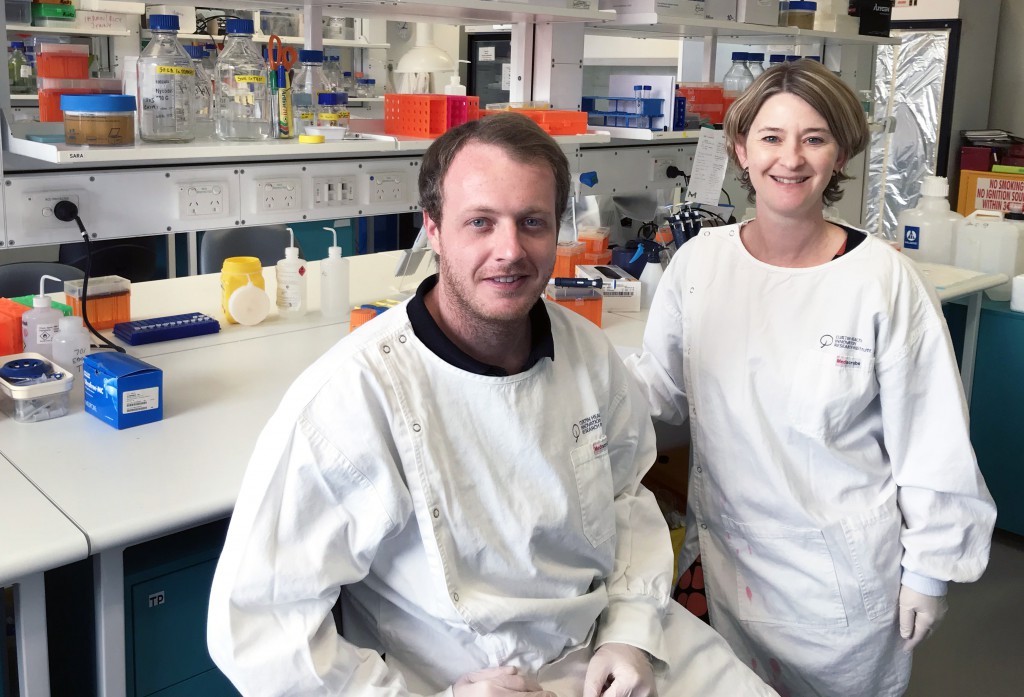
Inaugural Lions-Lotus PhD Scholarship recipient Nathan Main with his CHIRI co-supervisor, Associate Professor Nina Tirnitz-Parker.
Just like the liver functions to detoxify the body, the self-cleaning abilities of the lotus flower, known as ‘the lotus-effect’, are a symbol of long life and health.
The inaugural recipient of the Lions-Lotus PhD scholarship, Nathan Main, is aiming to improve both the lives and health of chronic liver disease patients through his research project at the Curtin Health Innovation Research Institute (CHIRI).
Supported by the Lions Cancer Institute, Nathan’s PhD project is supervised by CHIRI’s Associate Professors Nina Tirnitz-Parker and Pieter Eichhorn, from Curtin University’s School of Pharmacy and Biomedical Sciences, and WA gastroenterologist Professor John Olynyk.
Nathan’s research is focused on decoding the language cells use to communicate, which may contribute to cancer initiation. If found to be significant to liver disease, these cells may be targeted with therapeutics to block liver cancer formation.
Nathan recently presented on his PhD project to representatives from the Lions Cancer Institute, CHIRI and Curtin’s Faculty of Health Sciences and School of Pharmacy and Biomedical Sciences, at a special ceremony announcing his award, as the inaugural Lions-Lotus PhD Scholarship recipient. Read more…
Funds to help bring role of biometals in diabetes to light
Congratulations to Curtin Health Innovation Research Institute (CHIRI) diabetes researcher Dr Gae Ellison, from Curtin University’s School of Molecular and Life Sciences, who has received a $10,000 Early Career Researcher Grant from the Australian Institute of Nuclear Science and Engineering (AINSE).
Gae’s achievement comes with an opportunity to carry out postdoctoral research in collaboration with ANSTO, using the Australian Synchrotron Facility in Melbourne.
Gae will use the synchrotron technology for a detailed investigation of the biometals zinc, copper and iron in islets in the endocrine pancreas.
The powerful synchrotron light source will enable the mapping of these metals within the pancreas without the need for labelling, which can disturb the tissue and is a disadvantage of some other imaging technologies.
Gae is hopeful her work with the facility will uncover new information about the involvement of zinc and other metals in type 2 diabetes. Read more…
Putting the ‘pro’ in protein
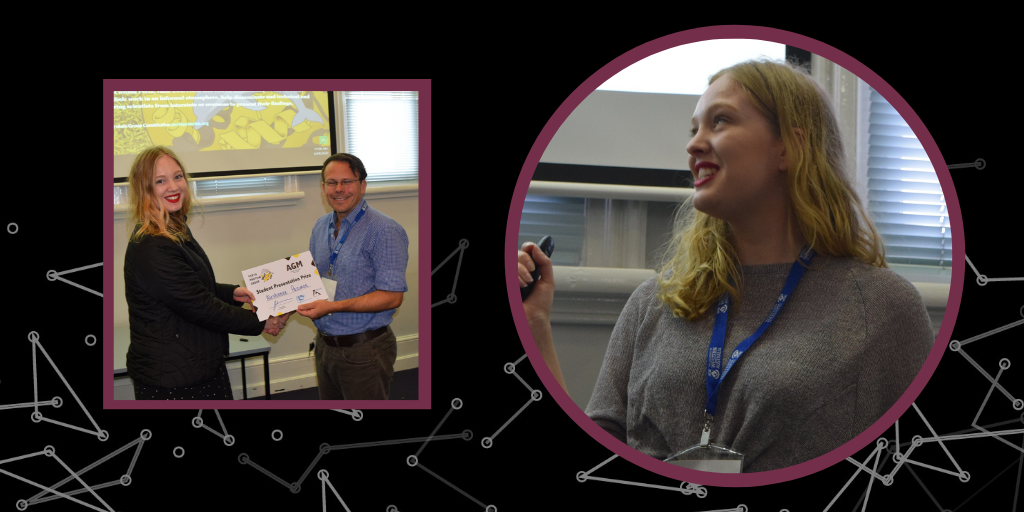
CHIRI Masters student Aleshanee Paxman gave an award winning presentation at the Perth Protein Group (PPG) AGM. She is pictured receiving her award from PPG Chair Associate Professor Joshua Mylne.
As Western Australia’s research community gathered for the inaugural Annual General Meeting of the Perth Protein Group (PPG) in Albany this month, several of the Curtin Health Innovation Research Institute (CHIRI) team were on hand to contribute their expertise and to celebrate an award-winning presentation by one of our students.
CHIRI Masters student Aleshanee Paxman delivered the Best Student Talk of the three-day event. Aleshanee’s presentation was on cell biology and cancer research she’s undertaking at CHIRI, as part of her Masters studies within Curtin University’s School of Pharmacy and Biomedical Sciences. Read more…
CHIRI researcher named tall poppy
A big and tall congratulations to CHIRI researcher Associate Professor Nina Tirnitz-Parker, who has received a 2020 Young Tall Poppy Science Award from the Australian Institute of Policy and Science (AIPS).
Nina, from Curtin University’s School of Pharmacy and Biomedical Sciences, is a liver cancer researcher chosen for the award for both her achievements in scientific research and getting word of her research out to the public. Read more…


